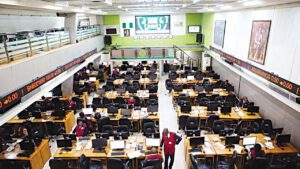Political uncertainty, others down domestic, foreign portfolio transactions on stock market by 31%
By Philemon Adedeji
On the backdrop of political uncertainty, low yield return on investment caused by double-digit inflation among other factors, domestic and foreign investors portfolio transactions on the Nigerian Exchange Limited (NGX) dropped nearly 31 per cent to N1.04 trillion in first five months of 2023 from N1.51trillion in first five months of 2022.
The prolonged foreign exchange scarcity, and hike in the Monetary Policy Rate by the Central Bank of Nigeria (CBN) had been taking their toll on the Nigerian economy and the stock market which is the barometer of the economy had seen mixed sentiments in transactions in the first five months.
In the period under review, domestic investors that comprised of retail and high network investors transactions in the stock market dropped to N945.02 billion, a decline of 28per cent from N1.3 trillion in the corresponding five months of 2022, while foreign investors’ participation in the stock market closed first five months at N99.34 billion, significantly dropping by 51per cent from N201.29 billion in first five months of 2022.
However, investors’ confidence was restored in May 2023 when Independent National Electoral Commission (INEC) final declared President Bola Tinubu the winner of the 2023 Presidential elections.
The securities market hit the biggest single-day gain in two years, rising by 5.23 per cent on May 29 as investors reacted positively to President Tinubu’s ‘no more fuel subsidy and immediate unification of exchange rates’ comments.
Tinubu also stated that his administration would be targeting a higher Gross Domestic Product (GDP) growth, create jobs, work towards a unified exchange rate and ensure that investors and foreign businesses repatriate their hard-earned dividends and profits home.
This resulted in a huge bounce as the total value of transactions executed by domestic investors outperformed transactions executed by foreign Investors by 76 per cent.
In May 2023, the total amount of transactions on the Exchange grew to N322.92 billion in the month of May as against N191.21 billion in the previous trading month, thus representing a 68.88 per cent increase.
The prolonged foreign exchange scarcity, and inflation among others had been taking their toll on the Nigerian economy and the capital market which is the barometer of the economy had seen mixed sentiments in transactions in the month under review.
Further analysis of the total transactions executed between the current and prior month (April 2023) revealed that total domestic transactions increased by 56.37 per cent from N182.74 billion in April to N285.76 billion in May 2023.
Similarly, total foreign transactions increased significantly by 338.72 per cent from N8.47 billion (about $18.31 million) to N37.16 billion (about $79.88million) between April 2023 and May 2023.
The Managing Director, Morgan Capital Securities Limited, Mr. Rotimi Olubi, had said that a successful 2023 general elections in Nigeria would further increase foreign portfolio outflows n the stock market.
He noted that domestic investors would be the key players responsible for the movement of the market and liquidity.
On the removal of oil subsidy and foreign unification, Olubi said the suspension would dampen the impact of high oil prices in the global markets to the Federal Government’s purse.
“The Federal Government will need to focus on making reducing the leakeages associated with the current subsidy/under recovery regime,” he said.
Olubi said that inflation was expected rise further following a direction reversal in December 2021 where inflation rose after an eight-month downward trend.
Commenting on FX reform policies, CEO, Wyoming Capital and Partners, Tajudeen Olayinka, said the reforms mean the market would see more foreign inflows and steady improvement to foreign reserves.
“Let me state clearly that CBN has not devalued the Naira, it only gave an indication that it would allow market to function henceforth. The essence is to allow law of one price to prevail over and through the market, in a way to allow convergence of rates and stimulate desirable capital inflows. It is also an indication that government intends to run a comprehensive adjustment program that could make the economy move steadily towards attaining internal equilibrium, while at the same time putting up appropriate policies and measures that will make the economy restore external equilibrium. Fuel subsidy is gone. Foreign exchange subsidy is gone.
“Desirable capital inflow is expected from this unfolding adjustment program. Let me also add that Capital Market will remain a major source of funding long-term capital requirements by firms and governments, as cost of capital in the economy moderates to a much lower level and capital formation increases to a new level that could create decent jobs and drive down inflation.”
He urged the new government and CBN to first and foremost eliminate the already known source(s) of exchange rate divergence, to be able to encourage a sustainable convergence of rates across markets.
“Again, and as I mentioned to you previously, all economic agents will initially experience short-run adjustment pains, and later, more desirable long-run gains and normal prices.
“President Tinubu is starting well, and we should encourage him to do more. If you have not invested in the stock market at this time, you might need to wait for IPOs, as more public companies approach the market for listing and capital raising.”
Meanwhile, in over a 16-year period, domestic transactions decreased by 45.30 per cent from N3.556 trillion in 2007 to N1.945 trillion in 2022 whilst foreign transactions also decreased by 38.47 per cent from N616 billion to N379 billion over the same period.
Also, total domestic transactions stood at N945.02 billion, whilst total foreign transactions closed the month under review at N99.34 billion.
The report also revealed that institutional investors outperformed retail Investors by 38 per cent while a comparison of domestic transactions in the current and prior month (April 2023) revealed that retail transactions icreased by 19.29 per cent from N74.19 billion in April to N88.50 billion in May 2023.
Similarly, the institutional composition of the domestic market increased significantly by 81.72 per cent from N108.55 billion in April 2023 to N197.26 billion in May 2023.




